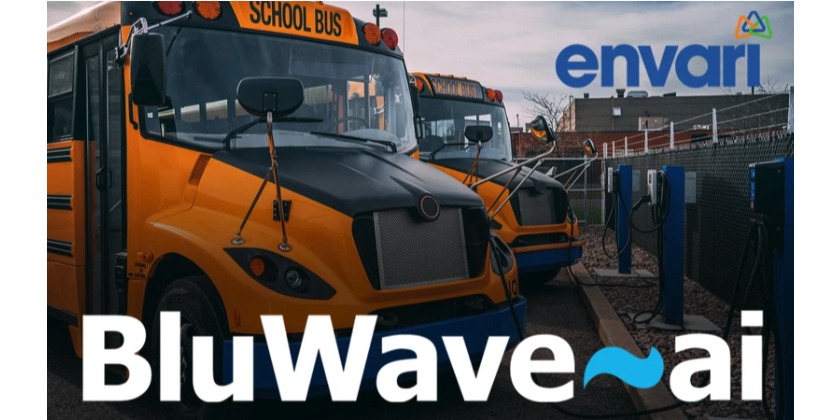BluWave-ai EV Fleet Orchestrator Enables 95% of School Bus Fleet to be Electrified

April 9, 2024
BluWave-ai and Envari Energy Solutions (Envari) announced the results of an initial project for a countrywide Canadian school bus operator for how it can achieve 95% fleet electrification using AI-driven optimization.
The school bus operator has between 500 to 1,000 school buses at multiple regional facilities in Canada. They plan to convert its fleet to zero-emission buses by 2040, with a goal to phase close to 300 battery electric school buses into service by 2026.
Envari, a wholly owned subsidiary of Hydro Ottawa, is providing engineering and project management services. To facilitate a plan for a smooth transition, BluWave-ai simulated various scenarios using a digital twin for the operations to assess the expected performance of an all-electric bus fleet.
The electrification of school bus fleets presents many challenges. This is especially true for operations in rural areas in Canada, having long service routes combined with temperatures changing from very cold winters to hot summers over a span of 60°C.
Operators need to provide the level of service required while reducing operational costs and capital expenditures for the transition to electric vehicles. It also provides many opportunities for fleet operators to reduce operating costs, reduce emissions, and support the electricity grid. While the buses are parked between student transport hours, with bidirectional chargers (V2G) they can be used to store and release energy, to support the grid to reduce demand during peaks in electricity grid usage.
BluWave-ai input route data into a digital twin simulating the whole fleet and depot network with different combinations and scenarios covering: home parking, weather, driving speeds, bus battery aging and capacity, number and power of chargers and conditions over a year. Expected electric vehicle energy requirements were calculated for all routes to assess feasibility and severity of any range shortcomings.
These simulations were run with BluWave-ai EV Fleet Orchestrator, using AI-driven predictions, fleet scheduling, and charging optimizations to find the optimal combinations of equipment, vehicle route assignments and charging strategies.
BluWave-ai also explored operational impacts of the transition and greenhouse gas (GHG) emission reduction using its EV Fleet Orchestrator software to optimize energy efficiency. The key findings include:
- 95% of current routes can be served with electric buses under normal operating conditions with real time AI data driven optimization
- In the worst-case scenario at -20°C, with end-of-life batteries and auxiliary heating, 85% of the routes can still be served with the same AI system
- Up to 5x reduction in depot peak charging load with BluWave-ai’s adaptively optimized charging strategy, reducing net energy costs and supporting the grid with a smaller grid connection
- 60% infrastructure cost reduction for electrification with BluWave-ai optimization
- 15x emissions reduction compared to diesel fleet tailpipe emissions
- 6-14dB noise reduction in urban environments versus diesel buses
“In BluWave-ai’s digital twin we showed the operator that it is feasible to electrify their operations to meet their zero-emission goals, and near-term roll out of a large electric bus fleet”, said Jim Pegg, Director M&E Engineering & Projects, Envari Energy Solutions. “Furthermore, by using BluWave-ai’s EV Fleet Orchestrator in the digital twin to optimize the operation, BluWave-ai demonstrated significant improvements for the project in terms of capital and operational costs along with lower emissions and noise pollution for students and the environment.”
Jim Pegg, Director M&E Engineering & Projects, Envari Energy Solutions
The EV Fleet Orchestrator used AI models trained with the fleet’s operational data and run in a year-round simulation using the digital twin. These models are ready for live deployment with the fleet as they roll out charging infrastructure and bring electric buses into service, ensure a lower upfront capital expense between buses, chargers and depot configurations, and lower operating expenses.
“We are pleased to work with Envari as partners leading the charge to electrify Canada’s transport sector. This validates a compelling use case for our EV Fleet Orchestrator for school bus fleet electrification given the challenging winter weather and long routes that are typical for operators in regions with climates such as Eastern Canada’s,” said Devashish Paul, CEO BluWave-ai,
“This solution is ready for deployment in other regions worldwide where school bus fleets operate. As the U.S. Environmental Protection Agency recently announced a further $1B for Clean School Bus Program Grants, the push to electrify is well underway in North America. Our EV Fleet Orchestrator is available to help accelerate the efficient rollout and help maximize use of such funding to make clean student transportation a reality across urban and rural regions.”
Devashish Paul, CEO BluWave-ai
The BluWave-ai EV Fleet Orchestrator can be configured for adaptation in different locations both in the planning and operational stages as a result of its 7 year global data set with over 15B records in the BluWave-ai Atlas systems underpinning the product offering.
